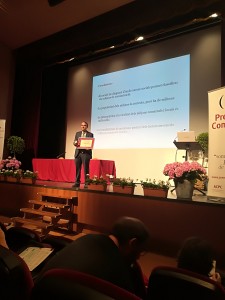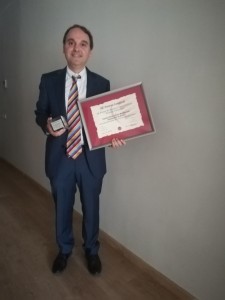Dr. Fondevila, Journalism University Research Award for an empirical model on the use and profitability of social networks
Dr. Joan Francesc Fondevila Gascón, professor at the Mediterrani University School (University of Girona), Pompeu Fabra University, Ramon Llull University, Open University of Catalonia (UOC), EAE-Universitat Politècnica de Catalunya (UPC), Euncet-UPC, Cesine and other universities, and director of the Cable Studies Center (CECABLE), received in Riudoms (Tarragona) the 9th Journalism University Research Award, organized by the Catalan Association of the Regional Press (ACPC), the Xarxa Vives de Universities and CaixaBank, for research “The use of social networks in the newspapers of the ACPC: formulas to achieve impact and income”. “Social networks are a great opportunity for local publications,” said Fondevila.

In the research, Fondevila creates a model to score the quality criteria of the use of social networks by the media. The algorithm combines popularity, interactivity, virality, feeling and profitability, allowing each publication to self-diagnose and discover its strengths and weaknesses. “In the environment of the Broadband Society, cloud journalism and social journalism commerce, establishing a holistic and at the same time objective metric is necessary to optimize the creation and dissemination of content,” Fondevila explains. “Not everything comes down to a return in money, but in influence and participation,” adds the director of CECABLE, which highlights the value of ROi (Return on influence) and ROP (Return on Participation), along with the usual ROI (Return on Investment).
Inspired by indicators from Murdough, Lovett, Bonsón and Ratkai and Barger and Labrecque, Fondevila created a model that was applied quantitatively to a statistical sample of ACPC publications. The result is that the diagnosis model of social networks allows us to classify, through a final score, the means of communication, that the popularity of Catalan local and local media is correct, that interactivity and virality are improvable, and that the feeling of the readers towards the Catalan regional and local media is positive. The difference in the use of social networks between analogue and digital publications is not significant. The presence and performance of the Catalan media in social networks are especially improvable in those media with less periodicity or with scarcer resources.
In the qualitative part, from the in-depth interviews different perceptions and desires emerged: presence in social networks is almost an obligation; it is necessary to decide conscientiously the amount of social networks in which to be present, and if the contents must be posted in an automated way; we have to talk with the readers; Content sharing is an indicator of quality, although remunerating that factor is debatable; you have to monitor the feeling; you have to combine content with income.
In the focus group, a correlation was observed between the popularity of a content unit and the probability of accessing it; the need to be present in social networks, to objectify the popularity and to apply the social journalism commerce; emotion was associated with loyalty; more interaction with the reader was required (through surveys or contests); the need for a moderator in the interaction was assumed; and it was requested to viralize the attractive contents, detect correlations between positive comments and more advertising results and control the frequencies in the publications. It was also raised that rewarding journalists according to the results is controversial, that the prestige of appearing in the media in business must be transformed, and that Industry 4.0 must be applied.
“This recognition is a source of great satisfaction: the research model confers objectivity to the analyzed object of study, places each media in the social network environment and offers guidelines for improvement,” says the Terrassa researcher Fondevila, Principal Investigator of the Research Group on Innovative Systems of Monetization of Digital Journalism, Marketing and Tourism (SIMPED) and the Research Group on Journalism and Digital Marketing and Broadband.
The University Research Prize is aimed at teachers and researchers from the Faculties of Communication Sciences in the field of Catalan Countries. The call is intended to address any issue related to the local and paper press edition and payment, with the use of the Internet as a priority, but also open to local journalism in general that takes place on local radios and televisions, portals digital information and any other technology.
The Catalan Association of the Regional Press (ACPC) is a non-profit organization that brings together almost all companies and publishing entities of regional and local press of general information existing in Catalonia, in paper or digital format, written in Catalan and with payment diffusion. Regional Press gathers newspapers printed daily, weekly, biweekly, biweekly, monthly, bimonthly and quarterly.

Xarxa Vives is a non-profit organization that represents and coordinates the joint action of 22 universities (Abat Oliba CEU University, University of Alicante, University of Andorra, Autonomous University of Barcelona, University of Barcelona, CEU Cardenal Herrera University, University of Girona, University of the Balearic Islands, International University of Catalonia, Jaume I University, University of Lleida, Miguel Hernández University of Elche, Open University of Catalonia, University of Perpignan, Via Domitia, Polytechnic University of Catalonia, Polytechnic University of Valencia, Pompeu University Fabra, Ramon Llull University, Rovira and Virgili University, University of Sassari, University of Valencia, University of Vic-Central University of Catalonia) of four European States (Andorra, Spain, France and Italy) in higher education, research and culture.






